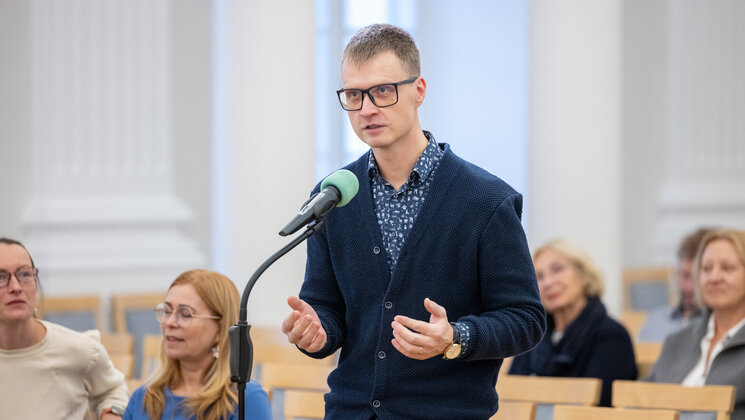-
Faculty of Arts and HumanitiesDean's Office, Faculty of Arts and HumanitiesJakobi 2, r 116-121 51005 Tartu linn, Tartu linn, Tartumaa EST0Institute of History and ArchaeologyJakobi 2 51005 Tartu linn, Tartu linn, Tartumaa EST0Institute of Estonian and General LinguisticsJakobi 2, IV korrus 51005 Tartu linn, Tartu linn, Tartumaa EST0Institute of Philosophy and SemioticsJakobi 2, III korrus, ruumid 302-337 51005 Tartu linn, Tartu linn, Tartumaa EST0Institute of Cultural ResearchÜlikooli 16 51003 Tartu linn, Tartu linn, Tartumaa EST0Institute of Foreign Languages and CulturesLossi 3 51003 Tartu linn, Tartu linn, Tartumaa EST0School of Theology and Religious StudiesÜlikooli 18 50090 Tartu linn, Tartu linn, Tartumaa EST0Viljandi Culture AcademyPosti 1 71004 Viljandi linn, Viljandimaa EST0Professors emeriti, Faculty of Arts and Humanities0Associate Professors emeriti, Faculty of Arts and Humanities0Faculty of Social SciencesDean's Office, Faculty of Social SciencesLossi 36 51003 Tartu linn, Tartu linn, Tartumaa EST0Institute of EducationJakobi 5 51005 Tartu linn, Tartu linn, Tartumaa EST0Johan Skytte Institute of Political StudiesLossi 36, ruum 301 51003 Tartu linn, Tartu linn, Tartumaa EST0School of Economics and Business AdministrationNarva mnt 18 51009 Tartu linn, Tartu linn, Tartumaa EST0Institute of PsychologyNäituse 2 50409 Tartu linn, Tartu linn, Tartumaa EST0School of LawNäituse 20 - 324 50409 Tartu linn, Tartu linn, Tartumaa EST0Institute of Social StudiesLossi 36 51003 Tartu linn, Tartu linn, Tartumaa EST0Narva CollegeRaekoja plats 2 20307 Narva linn, Ida-Virumaa EST0Pärnu CollegeRingi 35 80012 Pärnu linn, Pärnu linn, Pärnumaa EST0Professors emeriti, Faculty of Social Sciences0Associate Professors emeriti, Faculty of Social Sciences0Faculty of MedicineDean's Office, Faculty of MedicineRavila 19 50411 Tartu linn, Tartu linn, Tartumaa ESTInstitute of Biomedicine and Translational MedicineBiomeedikum, Ravila 19 50411 Tartu linn, Tartu linn, Tartumaa ESTInstitute of PharmacyNooruse 1 50411 Tartu linn, Tartu linn, Tartumaa ESTInstitute of DentistryL. Puusepa 1a 50406 Tartu linn, Tartu linn, Tartumaa ESTInstitute of Clinical MedicineL. Puusepa 8 50406 Tartu linn, Tartu linn, Tartumaa ESTInstitute of Family Medicine and Public HealthRavila 19 50411 Tartu linn, Tartu linn, Tartumaa ESTInstitute of Sport Sciences and PhysiotherapyUjula 4 51008 Tartu linn, Tartu linn, Tartumaa ESTProfessors emeriti, Faculty of Medicine0Associate Professors emeriti, Faculty of Medicine0Faculty of Science and TechnologyDean's Office, Faculty of Science and TechnologyVanemuise 46 - 208 51003 Tartu linn, Tartu linn, Tartumaa ESTInstitute of Computer ScienceNarva mnt 18 51009 Tartu linn, Tartu linn, Tartumaa ESTInstitute of GenomicsRiia 23b/2 51010 Tartu linn, Tartu linn, Tartumaa ESTEstonian Marine Institute0Institute of PhysicsInstitute of ChemistryRavila 14a 50411 Tartu linn, Tartu linn, Tartumaa EST0Institute of Mathematics and StatisticsNarva mnt 18 51009 Tartu linn, Tartu linn, Tartumaa EST0Institute of Molecular and Cell BiologyRiia 23, 23b - 134 51010 Tartu linn, Tartu linn, Tartumaa ESTTartu ObservatoryObservatooriumi 1 61602 Tõravere alevik, Nõo vald, Tartumaa EST0Institute of TechnologyNooruse 1 50411 Tartu linn, Tartu linn, Tartumaa ESTInstitute of Ecology and Earth SciencesJ. Liivi tn 2 50409 Tartu linn, Tartu linn, Tartumaa ESTProfessors emeriti, Faculty of Science and Technology0Associate Professors emeriti, Faculty of Science and Technology0Institute of BioengineeringArea of Academic SecretaryHuman Resources OfficeUppsala 6, Lossi 36 51003 Tartu linn, Tartu linn, Tartumaa EST0Area of Head of FinanceFinance Office0Area of Director of AdministrationInformation Technology Office0Administrative OfficeÜlikooli 17 (III korrus) 51005 Tartu linn, Tartu linn, Tartumaa EST0Estates Office0Marketing and Communication OfficeÜlikooli 18, ruumid 102, 104, 209, 210 50090 Tartu linn, Tartu linn, Tartumaa EST0Area of Vice Rector for ResearchUniversity of Tartu LibraryW. Struve 1 50091 Tartu linn, Tartu linn, Tartumaa EST0Grant OfficeArea of Vice Rector for DevelopmentCentre for Entrepreneurship and InnovationNarva mnt 18 51009 Tartu linn, Tartu linn, Tartumaa EST0University of Tartu Natural History Museum and Botanical GardenVanemuise 46 51003 Tartu linn, Tartu linn, Tartumaa EST0International Cooperation and Protocol Office0University of Tartu MuseumLossi 25 51003 Tartu linn, Tartu linn, Tartumaa EST0Area of RectorRector's Strategy OfficeInternal Audit OfficeArea of Vice Rector for Academic AffairsOffice of Academic AffairsUniversity of Tartu Youth AcademyUppsala 10 51003 Tartu linn, Tartu linn, Tartumaa EST0Student Union OfficeÜlikooli 18b 51005 Tartu linn, Tartu linn, Tartumaa EST0Centre for Learning and Teaching
Professor of Geoinformatics Evelyn Uuemaa speaks in her inaugural lecture about how AI can help get a better picture of the state of the environment

Evelyn Uuemaa, Professor of Geoinformatics at the University of Tartu, will deliver her inaugural lecture “Use of spatial data and artificial intelligence in environmental monitoring” in the university assembly hall on Wednesday, 13 March at 16:15. In the public lecture, the new professor will introduce her topic and field of research.
Changes in climate and land use have put our ecosystems under tremendous pressure, and the situation has deteriorated in many areas. This has led to the need for more effective monitoring of the state of the natural environment and the consequences of changes. This requires us to find rapid solutions to mitigate the situation, adapt to changes and predict future scenarios.
“The majority of research on the natural environment has so far been carried out in fieldwork settings, and the data obtained are generally considered the most accurate,” said Evelyn Uuemaa. The professor admitted, however, that fieldwork is very resource-intensive. “It is unthinkable that you could record information for every moment and each place at once in fieldwork. Remote sensing allows us to get data on each area of the world once a day or once a week. Unfortunately, such raw data are quite useless,” Uuemaa added.
The European Union, supported by the Green Deal and the Data Strategy, is committed to using geospatial data to build a digital twin of Earth under the Destination Earth initiative to model its natural and anthropogenic processes as precisely as possible. This development is supported by the Open Data Directive, which classifies spatial data as valuable data. The amount of such data has increased enormously over the last decade and more data is constantly made available from satellites, smart devices and all kinds of sensors.
High-quality spatial data are one of the main pillars of data-driven decision-making. “However, our ability to use these data and turn them into the information we need for decision-making has not kept pace with the speed at which data are generated. Artificial intelligence can be of great help, but without knowledge of the natural environment, it is also useless,” said Professor Uuemaa.
In the inaugural lecture, Uuemaa will give an overview of the potential use of spatial data and their importance in monitoring the state of the natural environment. She will discuss how artificial intelligence can add value to spatial data and how it can be applied to provide insights into environmental conditions where field data are lacking.
Evelyn Uuemaa graduated from the University of Tartu in 2003 with a bachelor's degree in geography. She also earned her master’s degree in geoinformatics and a PhD in landscape ecology and environmental protection from Tartu. In 2007, she defended her doctoral thesis, “Indicatory value of landscape metrics for river water quality and landscape pattern”. After that, she became a research fellow in geoinformatics at the University of Tartu and, in 2013, a senior research fellow. In 2015, Uuemaa received the Marie Skłodowska-Curie individual fellowship, which enabled her to complete a two-year postdoctoral fellowship at the National Institute of Water and Atmospheric Research in New Zealand. Since 2023, she has been Professor of Geoinformatics.
Evelyn Uuemaa leads the university’s Landscape Geoinformatics workgroup, which develops machine learning methods for geospatial analysis and modelling. In 2023, she was awarded by the European Research Council (ERC) the Consolidator Grant to develop models based on remote sensing data and machine learning, which will enable farmers and policymakers to plan nature-based solutions in the landscape to mitigate the negative environmental impact of intensive agriculture. Uuemaa is also the head of the Centre of Excellence for Sustainable Land Use, a board member of the Estonian Geoinformatics Society and a council member of the Association of Geographic Information Laboratories in Europe.
The inaugural lecture aims to give the new professor an opportunity to introduce herself and her field and topic of research. At the end of the public lecture, the audience can ask questions. Everyone interested is welcome. The inaugural lecture can be watched live on UTTV.
Inaugural lecture by Evelyn Uuemaa, Professor of Geoinformatics
Read more similar news





